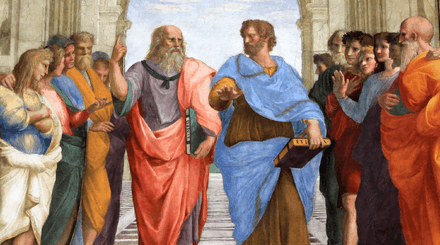Ezourvedam
The Ezourvedam is a forgery and a fraud "consisting of certain 'Vedic' materials translated by Jesuits with the intention of isolating elements most in harmony with Christianity."[1][2][3] Rather than an original Sanskrit work, the Ezourvedam turned out to be a French text, written by French Jesuits, and meant to be translated into Sanskrit.[4]
| History of Western philosophy |
|---|
 |
| The School of Athens fresco by Raphael |
| Western philosophy |
|
|
| See also |
History and authorship
A manuscript called Ezourvedam was given to Voltaire in 1760 by Louis-Laurent de Federbe, Chevalier de Maudave.[5] The text was in French, and said to be a French translation of a Sanskrit original.[5] Voltaire was enthusiastic about the work, had it copied, and brought it to the attention of others.[5] It was first published in 1778[4] (Voltaire died that same year). The genuineness of the Ezourvedam was first questioned in 1782; these doubts were confirmed in 1822.[4] Rather than an original Sanskrit work, the Ezourvedam turned out to be a French text, written by French Jesuits, and meant to be translated into Sanskrit.[4]
Title
The name Ezourvedam was sometimes taken to be a corruption of Yajurveda,[4] but the Ezourvedam has nothing in common with the Yajurveda.[4] The Ezourvedam itself refers to the Yajurveda as Zozu-vedam.[4] "Ezour" is the sandhi-form of "Ezous-", that is, "Jezus", based on the Latin pronunciation used by the Jesuits.[6] The name "Ezourvedam" means something like "Gospel of Jesus".[6]
Content
Ezourvedam is a French text in the form of a dialogue between two Vedic sages, one monotheist and one polytheist, they conclude the monotheism of 'pristine Hinduism' points to Christian truth and Hinduism is monotheism masquerading as polytheism concealing monotheism.[3]
See also
References
- Cowan 2010, p. 40.
- App 2011, p. 52.
- Doniger, Wendy. (March 2014). On Hinduism. Oxford. ISBN 9780199360079. OCLC 858660095.
- Maurer 1988, p. 327.
- Maurer 1988, p. 326.
- Maurer 1988, p. 328.
Sources
- App, Urs (2011), The Birth of Orientalism. Chapter 1: Voltaire's Veda, University of Pennsylvania Press, ISBN 978-0812200058
- Carrillo, Carlos Alonzo (2009), La bestia: controversias del cristianismo, Edamex, ISBN 9786074390018
- Cowan, Robert (2010), The Indo-German Identification: Reconciling South Asian Origins and European Destinies, 1765-1885, Camden House Publishing, ISBN 9781571134639
- Maurer, Walter Harding (1988), "Review of "Ezourvedam: A French Veda of the Eighteenth Century"", Journal of the American Oriental Society, 108 (2), doi:10.2307/603676, JSTOR 603676
- Rocher, Ludo (1984), Ezourvedam: A French Veda of the Eighteenth Century, John Benjamins Publishing, ISBN 0915027062
Further reading
- App, Urs (2011), The Birth of Orientalism. Chapter 1: Voltaire's Veda, University of Pennsylvania Press, ISBN 978-0812200058
- Rocher, Ludo (1984), Ezourvedam: A French Veda of the Eighteenth Century, John Benjamins Publishing, ISBN 0915027062